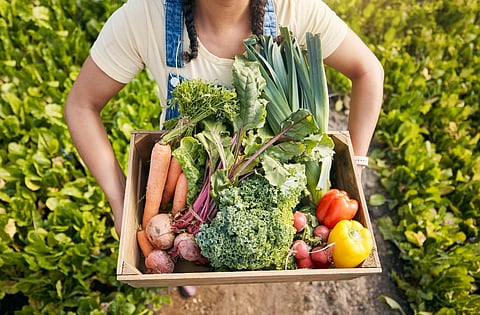
- Destinations
- Experiences
- Stay
- What's new
- Editor’s Picks
- Responsible Tourism
- CampaignsCampaigns
- Subscribe

People are progressively embracing a more sustainable way of life by modifying numerous lifestyle choices, such as building earth-friendly homes or growing their own food, and taking green holidays. There are several workshops and courses held across the country that will provide you with hands-on experience, such as making artisanal cheese or foraging for and cooking with wild edibles, to permaculture farming and more.
We are an Indo- French couple, François and Debarati Laederich who took a life changing decision to move to the Himalayas from the coast of South India. Inspired by the fresh mountain air, gurgling brooks and miles of undulating meadows, we decided to make Himachal our home and make use of bountiful offerings here to make artisanal cheeses! The production unit located in Mashobra valley, a small village nestled amongst the majestic views of the Shimla Hills and fields dotted with daisies. The grass-fed cows are hand-milked every morning by villagers, collected and brought to the unit where the cheese making process starts immediately. This partnership with the villagers has ensured supply of best quality milk which is the essence of high quality graded cheese. François was born and raised in Paris and is trained in the art of cheesemaking in Aurillac, Auvergne-Rhône-Alpes region of France. Love cheese, Always wanted to make at home. Amiksa is hosting a two-day weekend crash course in making cheese in March-April 2024. They will also host yoga retreats, farm-to-fork lunches, agro-tourism sessions, and more. Book you seats ASAP as they sell out fast. For more info, check here. For further details, write to them at reachus@amiksacheese.com or fill out a form on their website.
Smell Of The Earth is a farmstead in Birbhum (near Shantiniketan) owned by a couple who moved from the United States to Tagore's hometown. They bought land, built a stunning earth-friendly house, and founded a self-sufficient farmstead, which is now a hub of lessons on permaculture, food production, and living an eco-friendly lifestyle. The two-acre farm was built from bare, deforested soil and now provides most of the family's food requirements, including rice, wheat, lentils, potatoes, onions, veggies, and fish. Throughout the year, they organise a number of workshops and short courses to generate awareness about growing food. To kickstart the new year, they are hosting an Open Farm Day on January 27, 2024. It is a window into farming sustainably for food. And you will get to sample delicious dishes and buy products from the farm, such as preservative-free jams and syrups made using fruits from the farm, rice and other products. Enjoy the delicious food and the winter afternoon with friends or family in the bucolic surroundings of Birbhum. For details, WhatsApp them on 9748831271 or 9163732096. Check here for more.
In Meghalaya, a series of unique walks are aiming at building awareness about local knowledge systems on food and medicinal plants of the region. Held by Meghalaya slow food organisation NESFAS (North East Slow Food & Agrobiodiversity Society), the walks are usually led by a traditional knowledge holder or a custodian farmer of a particular community. Anyone who is interested in learning more about the region's rich biodiversity can join the free of cost walks. The walks are not fixed, and are conducted during various programs and for various purposes. Find out more here.
Tucked at the edge of a remote village, Vanvadi lies in the foothills of the Sahyadri range in the Western Ghat mountains. A three-hour drive from Mumbai, it is a sprawling 65-acre land with over 90 per cent tree cover, a small organic farm, and waterbodies. But what makes it special is the story behind it—a lesson in forest regeneration, rainwater harvesting, and offering a home to over 120 traditionally useful plant species, including over 5 varieties of forest food. More forest than farm—with its pristine, unpolluted environment, is ideal to pick up lessons in biodiversity and sustainable living. They host workshops on foraging, walks on wild edibles, as well as rainwater harvesting,through the year. Read more about them here and here. Know more about their walks and workshops here.
Travel to Angadibail, a small village nestled amidst the thick forests of the Western Ghats, to attend workshops and immersive experiences on wild edible foods, seasonal harvests, and surrounding ecosystems hosted by BuDa Folklore. BuDa began documenting native knowledge, oral tradition, and folk culture in Karnataka's Uttara Kannada region decades ago. Their work has changed over the decades, and today, in addition to recording, it showcases and seeks to preserve the region's folk culture and traditions. During the monsoon season, they host the Mungaru festival in the Angadibail forest, which celebrates the rains with paddy-transplanting activities. The festival also highlights the importance of land and seed preservation through the cultivation of folk rice varieties like halaga, ratnachuda, kempuhalaga, and hegge. Festivals like Mungaru play an important part in cultural preservation. Find more details about them here.
